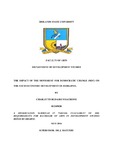Please use this identifier to cite or link to this item:
https://cris.library.msu.ac.zw//handle/11408/2995Full metadata record
| DC Field | Value | Language |
|---|---|---|
| dc.contributor.author | Nyachowe, Charlotte Rudairo | - |
| dc.date.accessioned | 2018-04-09T12:00:38Z | - |
| dc.date.available | 2018-04-09T12:00:38Z | - |
| dc.date.issued | 2016 | - |
| dc.identifier.uri | http://hdl.handle.net/11408/2995 | - |
| dc.description.abstract | The failure by the Zimbabwe African National Union-Patriotic Front (Zanu PF) to address the problems of growing poverty, unemployment and the adoption of the Economic Structural Adjustment Programme (ESAP) resulted in the deterioration of the living conditions of the hard working peasants in Zimbabwe. These problems led to a growing opposition by the Labour movement which was harboured by the Zimbabwe Congress of Trade Union (ZCTU). The alliance now included a broad coalition of labour and citizens groups such as churches, cooperatives, human rights organisations, and student groups, organised into the National Constitutional Assembly (NCA). The deterioration of these living conditions gave rise to a political movement known up to today as the Movement for Democratic Change (MDC). Motivated by the need to bring about democratic change and being a voice of the voiceless, MDC advocated for the basic human rights and democratic human centred development, development that is to transform the Zimbabwean peasantry. In doing so the MDC as an offshoot from the ZCTU organized strikes in a bid to put across their message to the ruling government and the masses of Zimbabwe. In a bid to explain more about the rise of MDC this research has used three theories which are the human development index (HDI), the basic needs approach and the democratisation theory. As a way of collecting data this research has employed qualitative research in includes the use questionnaires and interviews. The MDC has being involved in a GNU with Zanu PF and during its time in government it has made tangible results during its time in the government. It has offered itself as the voice of the voiceless through various demonstrations. It has made significant electoral reforms. Even to this day MDC wishes to offer itself as the way to return to normalcy, and blames the Zanu PF led government for three decades of misrule and poor governance at the hands of power hungry politicians that have transformed the jewel of Africa into an ailing state. | en_US |
| dc.language.iso | en | en_US |
| dc.publisher | Midlands State University | en_US |
| dc.subject | Labour movement | en_US |
| dc.subject | Politics | en_US |
| dc.subject | Zimbabwe | en_US |
| dc.title | The impact of the movement for democratic change (MDC) on the socio-economic development of Zimbabwe | en_US |
| item.languageiso639-1 | en | - |
| item.grantfulltext | open | - |
| item.fulltext | With Fulltext | - |
| Appears in Collections: | Bachelor Of Arts In Development Studies Honours Degree | |
Files in This Item:
| File | Description | Size | Format | |
|---|---|---|---|---|
| R124502R.pdf | Full Text | 1.35 MB | Adobe PDF |  View/Open |
Items in MSUIR are protected by copyright, with all rights reserved, unless otherwise indicated.



